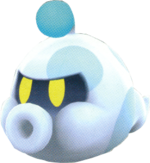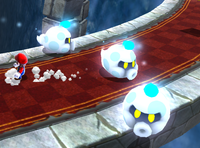Octoboo
| Octoboo | |||
|---|---|---|---|
 Artwork from Super Mario Galaxy 2 | |||
| First appearance | Super Mario Galaxy 2 (2010) | ||
| Variant of | Octoomba | ||
| |||
| |||
Octoboos[1] are enemies in Super Mario Galaxy 2. They are encountered in Haunty Halls Galaxy, Boo Moon Galaxy, and Flash Black Galaxy as regular enemies. They are Boos shaped like Octoombas, and Octoboos move around primarily by floating in a set area. Octoboos cannot be defeated, but they become transparent when the player uses a spin near them or from Yoshi's tongue. Octoboos also make small Octoomba sounds if Mario or Luigi is close to them. Unlike most members of the Octoomba family, they do not spit rocks.
In A Glimmer of Bulb Berry, they are the first enemies to be encountered. They can be found in groups while encircling a select area, behaving somewhat like Circling Boo Buddies or Peepas in later games. In Haunting the Howling Tower, Boo Mario has to avoid these enemies to progress through the area.
Names in other languages[edit]
| Language | Name | Meaning | Notes |
|---|---|---|---|
| Japanese | テレボー[2] Terebō |
Portmanteau of「テレサ」(Teresa, "Boo") and「タコボー」(Takobō, "Octoomba"); shared with a Boo character | |
| French | Poulboo[?] | Portmanteau of Poulba ("Octoomba") and "Boo" | |
| German | Oktobuu[?] | Portmanteau of Oktumba ("Octoomba") and Buu Huu ("Boo") | |
| Italian | Poliboo[?] | Portmanteau of Polipoomba ("Octoomba") and "Boo" |
References[edit]
- ^ Browne, Catherine (May 23, 2010). Super Mario Galaxy 2: PRIMA Official Game Guide. Roseville: Random House Inc. ISBN 978-0-30746-907-6. Page 28.
- ^ Sakai, Kazuya (Ambit), kikai, Akinori Sao, Junko Fukuda, Kunio Takayama, and Ko Nakahara (Shogakukan), editors. (October 19, 2015). 『スーパーマリオブラザーズ百科: 任天堂公式ガイドブック』. Tokyo: Shogakukan (Japanese). ISBN 978-4-09-106569-8. Page 160.
